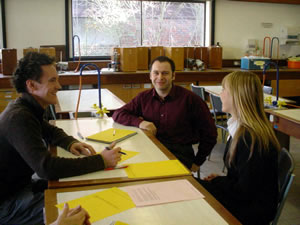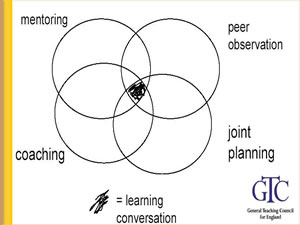Newsletter 1
Intervention to support the professional growth of new science and design technology
This newsletter reports on an intervention to support the professional growth of new science and design technology funded directly by GTEP. The first meeting of this project was held on Monday 21st February 2005.
The aim of the intervention is to develop, implement and evaluate a model of individualised support during the early years of science and design and technology teachers' careers to try to sustain commitment, motivation and challenge.
1) Setting up a support network:
Learning conversations are more likely to take place when there is an expectation of mutual learning from dialogue within a supportive environment where participants trust and respect each other and agree on a protocol of confidentiality. In this intervention members of the support network have completed PGCE courses at the Faculty of Education and consequently have a shared understanding of the expectations for effective science and design and technology teaching.

|

|
|
| Learning Together | Working Towards a Learning Conversation |
2) Encouraging Reflexive Practice:
The Faculty based meeting which took place on Friday 21st February encouraged new teachers to continue to reflect on their practice and offered support in the form of coaching by more experienced teachers working together to help generate individual solutions to professional challenges.
3) Problematising classroom practice:
Follow up classroom based problem solving was guided through a series of group activities and dialogue based on real experiences. Resources will be provided along with mentor support and a self appointed "buddy" for each new teacher to work on a problem during the spring and summer terms.
About the intervention
New teachers are often expected to take on the rôles and responsibilities of experienced teachers and to be as competent and effective on taking up a first post. These expectations are not shared by any other profession. Equally many new teachers bring expertise and experiences which are useful to the school which longer serving teachers don't have.
This intervention will try to help newly and recently qualified teachers understand that professional growth is neither simple nor linear in nature. The intervention activities will encourage new teachers to recognise that deficits in their professional profiles are open spaces for learning to become teachers rather than faults in them as emerging professional people.
Faculty based meetings and follow up school visits will enable learning conversations to take place.
Why should you reflect on your practice?
It is all too easy to become so involved in classroom dynamics that you loose sight of the big picture. Setting aside some time to stand back to adopt a neutral stance about what has gone on in your classroom will help you to improve your practice. This ability to retain a self consciousness about teaching along with an awareness of the learning potential inherent in each teaching episode is the key to improving and becoming a really effective teacher. The sorts of questions a reflexive teacher asks are: What did I do that was right or wrong? What did I do that worked or did not work? Why did I do the things that worked or did not work? How did my past and current experience of life and work influence me to behave in a particular way? Sometimes the answer to this last question is 'That is how I was taught or what the other teachers do'.
Drawing on good intentions alone will not lead to a change or improvements. To do this you need to analyse and identify the problem and seek help. By doing this you will learn that the key to real growth is through active problem solving.
So you need to do more thinking and not just 'inking'
Active problem solving requires more than simply 'inking' in lesson evaluations and requires thinking about and reflecting on your actual classroom practice. It necessitates that you come to an understanding of what it is that makes you react in the way you do in certain situations and to understand why students behave in the way they do in your classroom.
If you perceive that the problem lies outside your control you are unlikely to try to do anything to improve the situation. For example if you believe that the problem lies solely with the students and that it is their poor behaviour that is preventing you from making progress then you will continue to believe that there is nothing you can do. However if you have identified poor classroom behaviour as the key problem then you may need firstly to ask yourself 'Why do the students behave the way they do? Is it something to do with what I am asking them to do or how I am responding to them?'
Being reflexive about your classroom practice: Key Questions
What?
- What did I do that was right or wrong?
- What did I do that worked or did not work?
So What?
- What did the students learn? How do I know?
- Why did I do the things that worked or did not work?
- How did my past and current experience of life and work influence me to behave in a particular way?
Now What?
- What will I do next?
- Who can help me solve the problem?
- What will I do next lesson in response?
Direction Setting
- If I had a magic wand what changes would I make to my difficult classes?
- What would my lesson be like if everything was going right?
- How do the students feel about the situation? How do I know?
- What can I do to solve the problem and what is out of my control?
Contact Details
For more information on the Faculty's GTEP Projects, contact Elaine Wilson, Faculty of Education, University of Cambridge, 184 Hills Rd. Cambridge, CB2 8PQ, 01223 507173 ew208@cam.ac.uk" title="Email Elaine Wilson at ew208@cam.ac.uk
